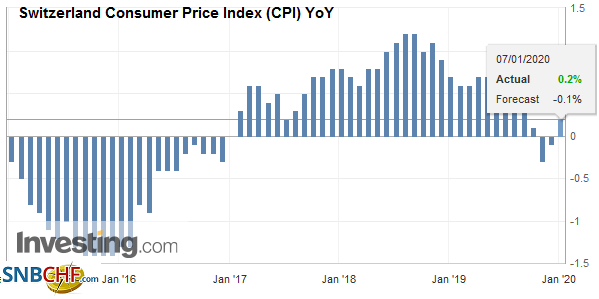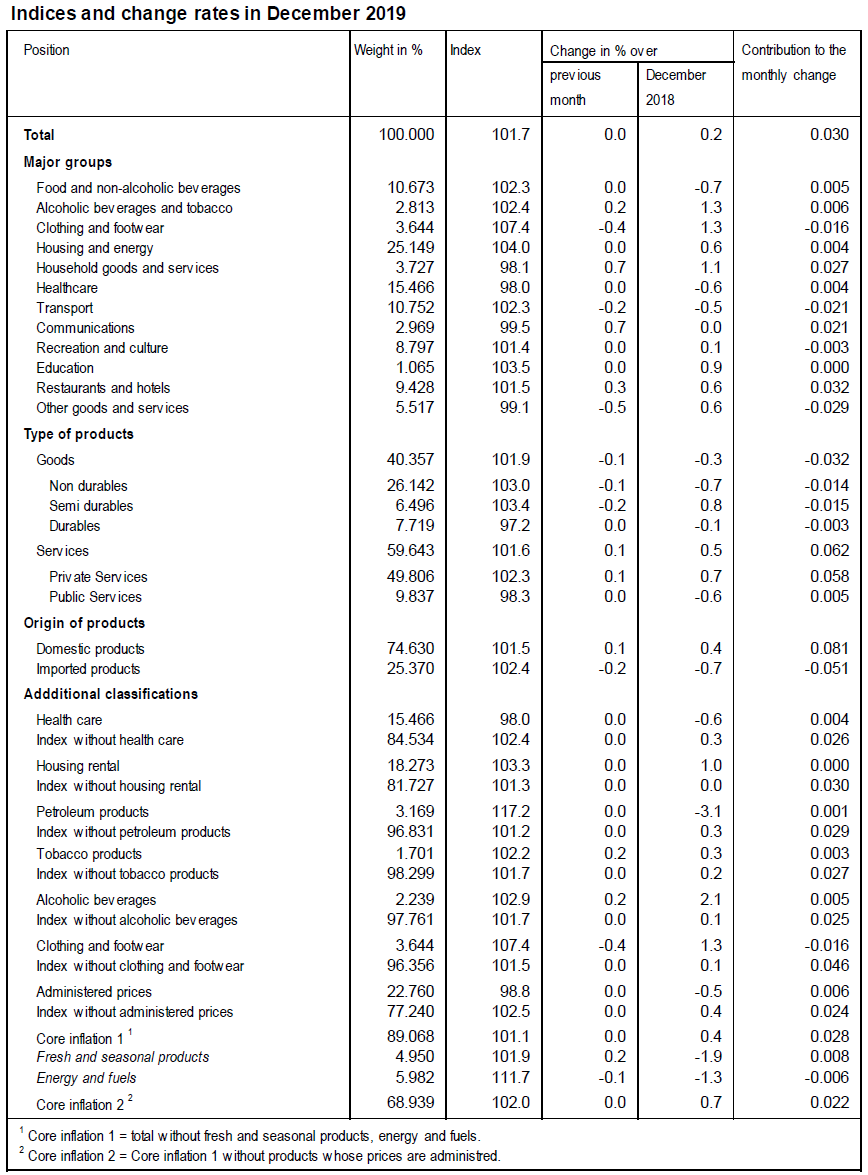07.01.2020 – The consumer price index (CPI) remained stable in December 2019 compared with the previous month, remaining at 101.7 points (December 2015 = 100). Inflation was +0.2% compared with the same month of the previous year. The average annual inflation reached +0.4% in 2019.These are the results of the Federal Statistical Office (FSO). The average annual inflation for 2019 corresponds to the rate of change between the annual average of the CPI for 2019 and that for 2018. The annual average is equal to the arithmetic mean of the 12 monthly indices of the calendar year. The average annual inflation reached +0.4% in 2019. This increase is due in particular to higher prices for housing rentals and for new cars. In contrast, prices for petroleum products and
Topics:
Swiss Statistics considers the following as important: 2) Swiss and European Macro, 2.) Swiss Statistics - Press Releases, Featured, newsletter, Switzerland Consumer Price Index
This could be interesting, too:
RIA Team writes The Importance of Emergency Funds in Retirement Planning
Nachrichten Ticker - www.finanzen.ch writes Gesetzesvorschlag in Arizona: Wird Bitcoin bald zur Staatsreserve?
Nachrichten Ticker - www.finanzen.ch writes So bewegen sich Bitcoin & Co. heute
Nachrichten Ticker - www.finanzen.ch writes Aktueller Marktbericht zu Bitcoin & Co.
| 07.01.2020 – The consumer price index (CPI) remained stable in December 2019 compared with the previous month, remaining at 101.7 points (December 2015 = 100). Inflation was +0.2% compared with the same month of the previous year. The average annual inflation reached +0.4% in 2019.These are the results of the Federal Statistical Office (FSO).
The average annual inflation for 2019 corresponds to the rate of change between the annual average of the CPI for 2019 and that for 2018. The annual average is equal to the arithmetic mean of the 12 monthly indices of the calendar year. The average annual inflation reached +0.4% in 2019. This increase is due in particular to higher prices for housing rentals and for new cars. In contrast, prices for petroleum products and medicines decreased. Prices for domestic products increased by +0.5% on average, those for imported products remained stable. The average annual inflation reached +0.9% in 2018 and +0.5% in 2017. The stability of the index compared with the previous month is the result of opposing trends that counterbalanced each other overall. Prices for hotels and mobile communication increased. In contrast, prices for products for face care and make-up and those for fruit or vegetables juices decreased. |
Switzerland Consumer Price Index (CPI) YoY, December 2019(see more posts on Switzerland Consumer Price Index, ) Source: investing.com - Click to enlarge |
| Harmonised Index of Consumer Prices (HICP)
In December 2019, the Swiss Harmonised Index of Consumer Prices (HICP) stood at 101.17 points (base 2015=100). This corresponds to a rate of change of +0.2% compared with the previous month and of –0.1% compared with the same month of the previous year. The average annual inflation rate is +0.4%. The HICP is a supplementary indicator for inflation based on a harmonised method across EU member countries. It enables inflation in Switzerland to be compared with that of European countries. The European Statistical Office, Eurostat, publishes the results according to a predefined calendar. The FSO publishes a comparison between inflation in Switzerland and Europe on the webpage www.hicp.bfs.admin.ch. A methodological note, the 2019 weighting of the Swiss standard HICP basket and the FSO News publication on the HICP are also available on this page. Eurostat will publish the December 2019 HICP indices for the other European countries on 17 January 2020. You will find the HICP results on the Eurostat website at the following address: https://ec.europa.eu/eurostat/web/hicp |
Download press release: Average annual inflation of +0.4% in 2019
Tags: Featured,newsletter,Switzerland Consumer Price Index


